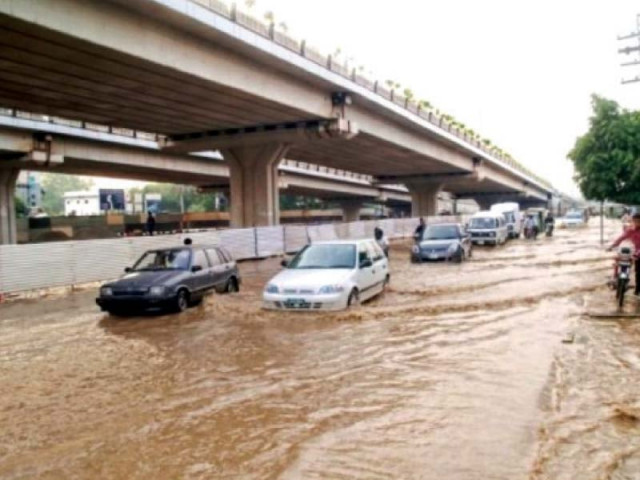Flash floods: Pakistan asked to upgrade early warning system
World Meteorological Organisation says Pakistan can become regional leader

Vehicles struggle to move along the flooded Muree Road in Rawalpindi. PHOTO: FILE
In a letter to the Federal Minister for Climate Change Zahid Hamid, the World Meteorological Organisation (WMO) has said that although Pakistan is already leader in South Asia and using flash flood guidance system, it can become regional centre by upgrading its system to South Asia Flash Flood Guidance (SAsiaFFG). The new system increases the scope of its application.
“Since its inception, there have been additional advancements in early warning system in numerical weather prediction and satellite estimation of precipitation that should be reflected in the new efforts on SAsiaFFG,” the letter said.
The aim is to reduce vulnerability of the region to hydro-meteorological hazards, particularly flash floods, by developing and implementing a guidance system through strengthening regional and national capacity to develop timely and accurate warnings.
Pakistan had shown its interest in performing the role of regional centre for the system, which was agreed by all participants at a planning workshop held in Kathmandu, Nepal in November 2012.
The Pakistan Meteorological Department (PMD) had been involved in implementation of the Pakistan Flash Flood Guidance System. The country is already a leader in the region in using such an early warning system.
“At COP21 in Paris, our delegation led by Minister for Climate Change Zahid Hamid had held a meeting with WMO secretary general along with Punjab Minister for Environment Zakia Shahnawaz, PMD Director General Dr Ghulam Rasul and Director-General Climate Change,” the ministry’s Secretary Arif Ahmed Khan told The Express Tribune.
They had briefed the secretary general about climate vulnerabilities of Pakistan despite being the least contributor to environmental degradation including recurring floods, drought, heat waves, glacier retreat and sea level rise.
Khan said flash floods have a different nature than river floods, having notably short time scales and occurring in small spatial ranges, which makes their forecasting quite a challenging and different than traditional approaches.
“Pakistan experiences 3,044 glacier lake outburst floods (GLOF), of which 36 are termed potentially very dangerous,” GLOF Pakistan Project Head Muhammad Khalil said.
He said during flash floods last year, losses were minimised by issuing early warnings.
He added that the ministry in cooperation with PMD had started GLOF pilot project in three valleys -- two in Chitral and one in Bagrote Valley of Gilgit-Baltistan -- and established early warning system this year.
Published in The Express Tribune, January 8th, 2016.



















COMMENTS
Comments are moderated and generally will be posted if they are on-topic and not abusive.
For more information, please see our Comments FAQ